World History
 |
 |
 |
 |
 |
 |
 |
The French Revolution - I
The People Never Make a Revolution
The Marxists always say that it is the poor people who make revolutions. But the class that made the French Revolution was the rich class, the bourgeoisie.
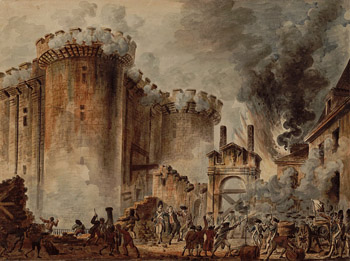 The seeds of Revolution were, for the most part, sown and cultivated by the nobles of the court, many members of the clergy, intellectuals and the upper bourgeoisie. Studies show that not even 10% of the people in France were in favor of the Revolution. The ordinary people, the common people, were always opposed to the Revolution because they supported the Church and clung to their traditional way of life. (1)
The seeds of Revolution were, for the most part, sown and cultivated by the nobles of the court, many members of the clergy, intellectuals and the upper bourgeoisie. Studies show that not even 10% of the people in France were in favor of the Revolution. The ordinary people, the common people, were always opposed to the Revolution because they supported the Church and clung to their traditional way of life. (1)
Even to our day, the revolutionary leaders always make it appear that the little people are the ones who initiate and support revolutions. But it is a well known fact that a few men may lead a host of people to do something that the multitude does not want to do.
This is affirmed by George Jacques Danton, one of foremost radical revolutionary leaders of the French Revolution who would become one of its victims on the guillotine in 1794, the same year the 16 Carmelites of Compiègne were martyred.
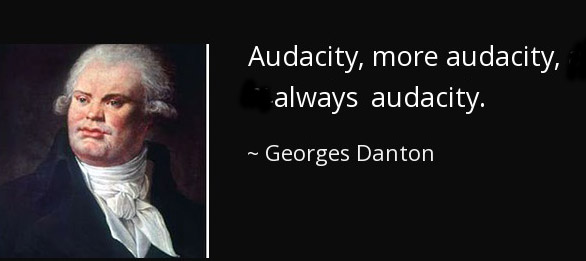 The French were victorious against the Austrian Netherlands in late April 1792 in what came to be called the War of the First Coalition. Belgium revolutionaries desiring to ignite a revolution in their own country consulted the fiery orator Danton. They thought that if they could only persuade Danton to speak, the people would become inflamed and revolt.
The French were victorious against the Austrian Netherlands in late April 1792 in what came to be called the War of the First Coalition. Belgium revolutionaries desiring to ignite a revolution in their own country consulted the fiery orator Danton. They thought that if they could only persuade Danton to speak, the people would become inflamed and revolt.
But Danton replied: “What? The principles of Equality and Liberty are fine for your books. But you do not make a revolution with them! To make a revolution you need paid bandits. Get them for me, and then I will make a revolution for you.” (2)
Danton left us many prosaic statements that explain the true nature of revolution. This is one of his most famous: “In revolutions authority remains with the greatest scoundrels.” (3)
Weak reaction to the French Revolution
It is a lamentable fact that the French Revolution is not rejected as it should be in Catholic textbooks and lectures. Soft reactions have led to the falls of monarchies, the Communist Revolution, and the chaotic state of the world today where faith in democracy is rapidly declining, setting the stage for the New World Order already desired by the architects behind the French Revolution. (4)
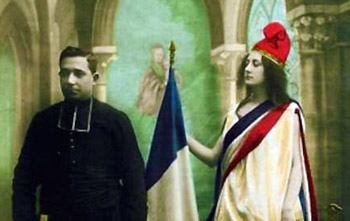 Theoretically, some principles of the French Revolution were condemned by the Church, for example, Secularism, and to a lesser degree Egalitarianism. But the reaction was not enough to quell the growing propaganda spreading those revolutionary principles.
Theoretically, some principles of the French Revolution were condemned by the Church, for example, Secularism, and to a lesser degree Egalitarianism. But the reaction was not enough to quell the growing propaganda spreading those revolutionary principles.
Years after the Revolution, the Ralliement policy of Leo XIII, which sought a reconciliation of the Church with the modern world, fostered Secularism. This policy aimed to reconcile the Church with the secular, Masonic Third Republic in France by admitting that the Church could support the republican institutions.
The spirit of Secularism, especially in the United States where patriots sought to justify our own American Revolution, generated a weak condemnation of the French Revolution, even among strong Catholics. The powerful myth was invented that the Revolution was only evil in its violent side. Once its brutal, bloodthirsty phase had finished, it bequeathed to humanity the valid principles of equality and liberty that influenced not only our republic, but the political structure of democracies around the world.
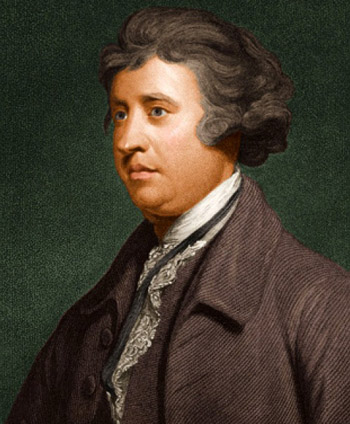 One conservative political thinker of the time, the Englishman Edmund Burke (1729-1797), reflected the general attitude towards the French Revolution. While opposing its violence and brutality, he did not reject the essential principles that inspired it. Burke preferred the English version of revolution, which maintained tradition, continuity and gradual reform based on practical experience. He believed that the French should have modeled themselves after the British in staging their change in government. (5)
One conservative political thinker of the time, the Englishman Edmund Burke (1729-1797), reflected the general attitude towards the French Revolution. While opposing its violence and brutality, he did not reject the essential principles that inspired it. Burke preferred the English version of revolution, which maintained tradition, continuity and gradual reform based on practical experience. He believed that the French should have modeled themselves after the British in staging their change in government. (5)
His soft position toward the English Revolution – which saw a King beheaded and Parliament granted expanded powers – essentially sanctions the "imprudent" French Revolution because it refuses to vehemently reject the new Masonic ideals that generated both of them. (6)
This weak rejection of the French Revolution has engendered the errors that dominate our modern world. Yesterday, the argument that “only the violence should be condemned” was applied to the French Revolution. Today, that same reasoning is being applied to the Communist Revolution. That is, once emptied of its oppressive and tyrannical character, Communism can generate a world of peace and justice. It is only its excesses – its violent first phase – that should be criticized.
This position is revolutionary.
Analyzing the tragic results of the French Revolution in the early 1800s, Catholic ultramontane historian Joseph de Maistre (1753-1821) provides us with the counter-revolutionary position.
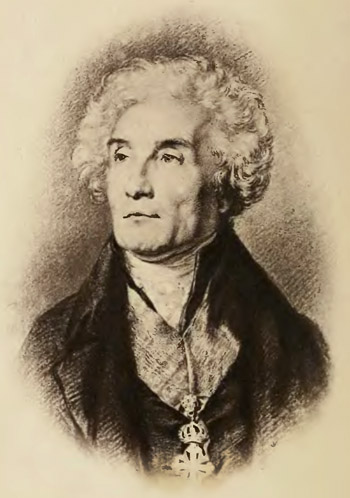 A Savoyard lawyer and writer who lived through the Revolution, he blasted its leaders as the most vile, base and immoral of people ever assembled in the history of men: “On what page of history will you find such a great quantity of vices assembled at one time on the same stage? What a horrible assemblage of baseness and cruelty! What profound immorality! What absence of all decency!” (7)
A Savoyard lawyer and writer who lived through the Revolution, he blasted its leaders as the most vile, base and immoral of people ever assembled in the history of men: “On what page of history will you find such a great quantity of vices assembled at one time on the same stage? What a horrible assemblage of baseness and cruelty! What profound immorality! What absence of all decency!” (7)
De Maistre refused to take the lukewarm position that the Revolution was too radical and bloody but in the end produced some good results. He analyzed its goals and its methods and came to this conclusion: It was evil because it wanted to destroy the entirety of the old order: monarchy, aristocracy, and the Catholic Church.
The overthrow of the old order was nothing less than “an insurrection against God.” (8) And in fact, the new revolutionary authorities murdered the King and abolished the Catholic Monarchy, strangled the Church and nationalized her properties and guillotined thousands of priests and nobles.
To effectively oppose the French Revolution, de Maistre insisted, one must adamantly combat the infamous principles that were both its cause and justification. This is the counter-revolutionary position.
To take this position, one needs to know the Revolution’s underlying causes, the facts of what took place, and its short and long term effects. This is what I propose to set out in thhis articles.
Continued
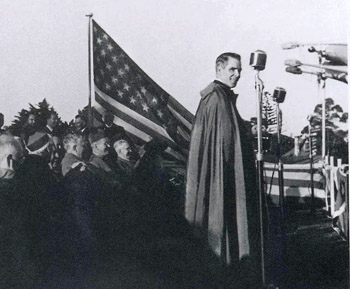


The storming of the Bastille, 1789:
directed by a small group of revolutionaries
Even to our day, the revolutionary leaders always make it appear that the little people are the ones who initiate and support revolutions. But it is a well known fact that a few men may lead a host of people to do something that the multitude does not want to do.
This is affirmed by George Jacques Danton, one of foremost radical revolutionary leaders of the French Revolution who would become one of its victims on the guillotine in 1794, the same year the 16 Carmelites of Compiègne were martyred.

‘Give me paid bandits & I will make a revolution for you’
But Danton replied: “What? The principles of Equality and Liberty are fine for your books. But you do not make a revolution with them! To make a revolution you need paid bandits. Get them for me, and then I will make a revolution for you.” (2)
Danton left us many prosaic statements that explain the true nature of revolution. This is one of his most famous: “In revolutions authority remains with the greatest scoundrels.” (3)
Weak reaction to the French Revolution
It is a lamentable fact that the French Revolution is not rejected as it should be in Catholic textbooks and lectures. Soft reactions have led to the falls of monarchies, the Communist Revolution, and the chaotic state of the world today where faith in democracy is rapidly declining, setting the stage for the New World Order already desired by the architects behind the French Revolution. (4)

Leo XIII sought to make a truce between the Church & the Republic that emerged from the French Revolution
Years after the Revolution, the Ralliement policy of Leo XIII, which sought a reconciliation of the Church with the modern world, fostered Secularism. This policy aimed to reconcile the Church with the secular, Masonic Third Republic in France by admitting that the Church could support the republican institutions.
The spirit of Secularism, especially in the United States where patriots sought to justify our own American Revolution, generated a weak condemnation of the French Revolution, even among strong Catholics. The powerful myth was invented that the Revolution was only evil in its violent side. Once its brutal, bloodthirsty phase had finished, it bequeathed to humanity the valid principles of equality and liberty that influenced not only our republic, but the political structure of democracies around the world.

Edmund Burke’s rejection of the Revolution was weak
His soft position toward the English Revolution – which saw a King beheaded and Parliament granted expanded powers – essentially sanctions the "imprudent" French Revolution because it refuses to vehemently reject the new Masonic ideals that generated both of them. (6)
This weak rejection of the French Revolution has engendered the errors that dominate our modern world. Yesterday, the argument that “only the violence should be condemned” was applied to the French Revolution. Today, that same reasoning is being applied to the Communist Revolution. That is, once emptied of its oppressive and tyrannical character, Communism can generate a world of peace and justice. It is only its excesses – its violent first phase – that should be criticized.
This position is revolutionary.
Analyzing the tragic results of the French Revolution in the early 1800s, Catholic ultramontane historian Joseph de Maistre (1753-1821) provides us with the counter-revolutionary position.

Joseph de Maistre: The French Revolution is
‘an insurrection against God’
De Maistre refused to take the lukewarm position that the Revolution was too radical and bloody but in the end produced some good results. He analyzed its goals and its methods and came to this conclusion: It was evil because it wanted to destroy the entirety of the old order: monarchy, aristocracy, and the Catholic Church.
The overthrow of the old order was nothing less than “an insurrection against God.” (8) And in fact, the new revolutionary authorities murdered the King and abolished the Catholic Monarchy, strangled the Church and nationalized her properties and guillotined thousands of priests and nobles.
To effectively oppose the French Revolution, de Maistre insisted, one must adamantly combat the infamous principles that were both its cause and justification. This is the counter-revolutionary position.
To take this position, one needs to know the Revolution’s underlying causes, the facts of what took place, and its short and long term effects. This is what I propose to set out in thhis articles.
Continued

Archbishop Sheen, a strong proponent of Americanism
- Elisha Greifer, Joseph de Maistre and the Reaction against the 18th Century, The American Political Science Review, Sep 1961, Vol 55, No 3 (Sept 1911), p 591.
- Paraphrased from Franz Dumont, Die Mainer Republik von 1792-/93: Studienm zur Revolutionierung in Rheinhessen und der Pfalz, Berlin: Alzey, 1982.
- https://www.azquotes.com/author/20262-Georges_Danton
- Plinio Correa de Oliveira, "Revolução Francesa: o grande resumo e a grande parábola da História. Sua importância para o apostolado contra-revolucionário," Marach 13, 1971 https://www.pliniocorreadeoliveira.info/revolucao-francesa-o-grande-resumo-e-a-grande-parabola-da-historia-sua-importancia-para-o-apostolado-contra-revolucionario/#gsc.tab=0
- In his essay analyzing Burke’s position toward revolution, historian Jeffrey Hart notes: “And yet, whatever the debates about detail, it remains the fact that both rebellions or revolutions [the English and the French] involved the overthrow of an absolute monarch and, indeed, his execution. In both, absolute monarchy was abolished forever, and new sources of legitimacy had to be sought. It might fairly be said that the medieval system of divine right was extinguished. In both England and France, parliamentary bodies came into conflict with the court, and both upheavals resulted in a shift of power from crown to legislature.” “Edmund Burke & the English Revolution,” https://theimaginativeconservative.org/2023/08/edmund-burke-english-revolution-jeffrey-hart.html
- On the Great Seal of the United Sates, beneath the pyramid topped with the all-seeing eye in a triangle are the word Novus Ordo Seclorum ("new order of the ages), announcing the Masonic aims of the Revolution.
- Joseph De Maistre and the Metaphysics of the French Revolution, https://minervawisdom.com/2022/08/23/joseph-de-maistre-and-the-metaphysics-of-the-french-revolution/ Elisha Greifer, “Joseph de Maistre and the Reaction against the 18th Century,” The American Political Science Review, Sep, 1961, Vol. 55, No. 3, p.596.
- Ibid.

Posted October 18, 2023
______________________
______________________





